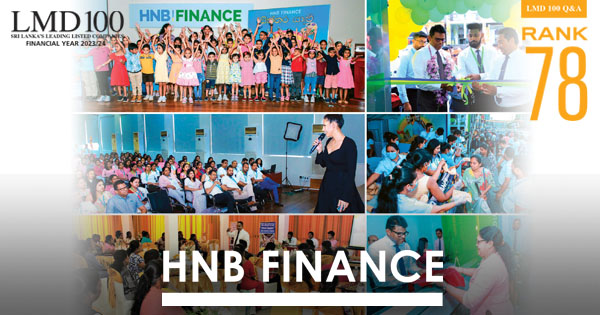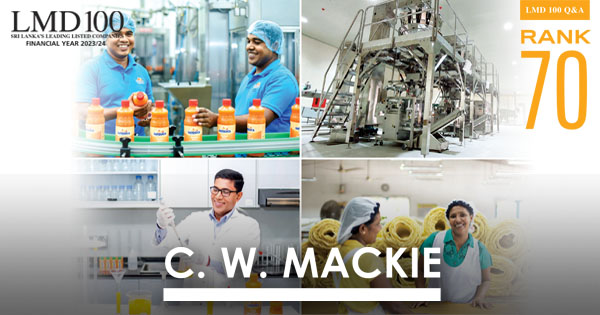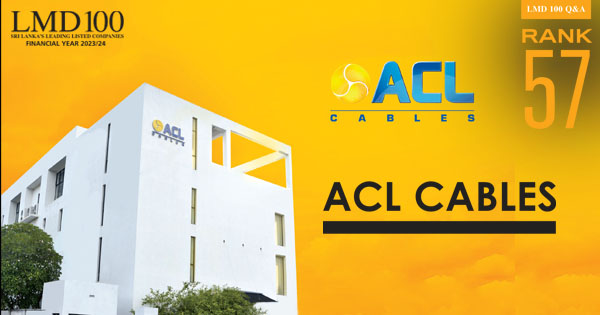CIC HOLDINGS
LMD 100 Q&A
RANK 27
Our business verticals work closely with regulators, emphasising the need for a robust, adaptable policy framework aligned with global standards involving all stakeholders

Q: How has CIC’s journey evolved over the years – and how do you plan to continue the organisation’s legacy?
A: CIC’s 60 year journey reflects prudent leadership and strategic decisions that shaped our evolution from agrochemicals to a diverse portfolio. Through acquisitions in fertiliser, agri-based entities, government farm leasings in Pelwehera and Hingurakgoda, and research and development investments, we have strengthened our agricultural expertise.
We have also expanded into pharmaceuticals, natural ingredients and herbal personal care with Link Natural, and have nurtured citizens through consumer brands such as Besto chicken, Creamoo dairy products, health and speciality rice, and FMCG products through Link Natural. With legacy brands, CIC remains committed to offering quality products, ensuring value creation for stakeholders.

Group Chief Executive officer
Q: As Sri Lanka embarks on a fresh chapter in the context of politics and the economy, how ready and geared is the corporate sector to drive growth while overcoming the ripples of past challenges?
A: The private sector including SMEs has long been the engine of growth in Sri Lanka. However, the economy and citizens have faced major setbacks since the Easter attacks of 2019. As the country enters a new political chapter, there is hope for policy consistency which would help attract local and foreign investments.
Additionally, customising the IMF programme to local needs and staying on course will strengthen the fabric of the nation. The corporate sector – including SMEs and the manufacturing sector – is geared to seize growth opportunities and compete regionally, by improving production and energy costs to improve export competitiveness.
Q: Considering the South Asian region, what business and investment prospects do you see for your group?
A: Expanding into India requires strategic partnerships. Our brand Samahan, promoted by celebrities such as Bollywood actor Amitabh Bachchan, indicates potential in niche market segments in healthcare and pain relief.
Additionally, expanding exports, agricultural input partnerships, enhancing manufacturing by developing processing avenues in fruits and vegetables, offer opportunities to reduce local dependency and improve competitiveness in the South Asian market.
Q: What are the main challenges facing the sector at present?
A: Our business verticals work closely with regulators, emphasising the need for a robust, adaptable policy framework aligned with global standards involving all stakeholders. Climate change also poses a significant challenge.
While we adopt environmental, sustainable and corporate governance (ESG) principles, the nation must implement climate adaptive agricultural policies.
Moreover, monitoring global commodity and fertiliser prices is crucial due to supply chain risks and geopolitical tensions.
Q: How should businesses operating in Sri Lanka nurture enabling organisational cultures to make the most of a diverse workforce?
A: At CIC, fostering an inclusive, productivity driven culture is the key especially with a diverse workforce of millennials and Gen Z. The sense of social purpose is crucial – especially for younger generations – as seen during the COVID-19 pandemic when our healthcare workers took personal risks to ensure timely deliveries.
Our code of conduct and emphasis on continuous learning and development, supported by domain expertise and exposure to global best practices, foster empowerment and growth among employees.
Q: What trends do you observe in the sector – and what have you done as a business to optimise some of these?
A: Over 50 percent of our revenue is from trading activities and the rest from manufacturing. In trading, for agricultural inputs – precision farming, utilising technology such as drones for fertiliser application and mobile apps to advise farmers on optimal farming practices are key trends.
In terms of pharmaceutical trading – by combining dosage tablets for ease of use, we have enhanced the efficacy of our manufacturing processes, enabling us to deliver high quality products through our dedicated R&D efforts.
We see strong potential in locally manufactured branded generics, which are in demand due to their affordability. There is also significant potential in enhancing recycling materials in polyethylene terephthalate (PET) bottle manufacturing towards strengthening the ESG footprint in the country.
REVENUE (RS. M)
76,424
REVENUE CHANGE
12%
PROFIT AFTER TAX (RS. M)
11,021
PROFIT CHANGE
10%
TOTAL ASSETS (RS. M)
78,487
SHAREHOLDERS’ FUNDS (RS. M)
34,893
MARKET CAP (RS. M)
25,151
EARNINGS PER SHARE (RS.)
25.70
PRICE EARNINGS RATIO
2.74
EMPLOYEES
2,070
Telephone: 2359359 | Email: info@cic.lk | Website: cic.lk





